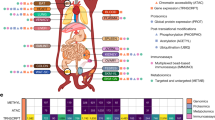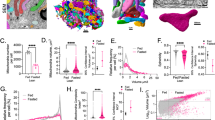Abstract
IT has been demonstrated that a riboflavin deficiency in the rat produces a marked derangement in those enzyme systems which are involved in the oxidation of certain intermediates of carbohydrate metabolism (Axelrod and Elvehjem, unpublished results). The possible effects of such a deficiency upon the metabolism of amino-acids have been suggested by the discovery of Warburg and Christian1that the prosthetic group of the d-amino-acid oxidase of Krebs2 is a flavin-adenine dinucleotide.
This is a preview of subscription content, access via your institution
Access options
Subscribe to this journal
Receive 51 print issues and online access
$199.00 per year
only $3.90 per issue
Buy this article
- Purchase on Springer Link
- Instant access to full article PDF
Prices may be subject to local taxes which are calculated during checkout
Similar content being viewed by others
References
Warburg, O., and Christian, W., Biochem. Z., 298, 150, (1938).
Krebs, H., Z. physiol. Chem., 217, 191, (1933).
Elvehjem, C. A., Koehn, C. J., and Oleson, J. J., J. Biol. Chem., 115, 707, (1936).
Snell, E., and Strong, F., Ind. and Eng. Chem., ii, 346 (1939).
Ball, E. G., Science, 88, 131, (1938).
Author information
Authors and Affiliations
Rights and permissions
About this article
Cite this article
AXELROD, A., SOBER, H. & ELVEHJEM, C. Reduction of the d-Amino-Acid Oxidase Content of Rat Tissues in Riboflavin Deficiency. Nature 144, 670–671 (1939). https://doi.org/10.1038/144670a0
Issue Date:
DOI: https://doi.org/10.1038/144670a0
This article is cited by
-
Der Einfluss der Höhe Der Eiweisszufuhr auf die Aktivität von Oxydationsfermenten in den Organen
Klinische Wochenschrift (1947)
-
Erniedrigte d-Aminos�ureoxydase-Wirksamkeit in der Leber tumorkranker Ratten
Die Naturwissenschaften (1942)
Comments
By submitting a comment you agree to abide by our Terms and Community Guidelines. If you find something abusive or that does not comply with our terms or guidelines please flag it as inappropriate.



